|
|
|
Sort Order |
|
|
|
Items / Page
|
|
|
|
|
|
|
| Srl | Item |
| 1 |
ID:
128463


|
|
|
|
|
| Publication |
2014.
|
| Summary/Abstract |
Consumers, partnering with corporations and celebrities, are forming new alliances in international development through what we call 'Brand Aid' initiatives. At a time of shifting relationships between public and private aid, commodities are sold as the means of achieving development for recipients and good feelings for consumers simultaneously. In this article we first formalise our conceptual model of Brand Aid at the triple interface of causes, branded products and celebrities. Then we conduct a systematic empirical analysis of contemporary Brand Aid initiatives, including three in-depth case studies of 'Win One Give One', toms shoes and Product (red). We argue that these not only use imaginaries of development to sell products to Northern consumers but also engage in the work of a 'story factory' - producing truths about international development and consumer engagement that make development appear simplified, manageable and marketable. We conclude that, in Brand Aid, the problems themselves and the people who experience them are branded and marketed to Western consumers (through celebritised multimedia story-telling) just as effectively as the products that will 'save' them.
|
|
|
|
|
|
|
|
|
|
|
|
|
|
|
|
| 2 |
ID:
175105
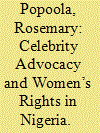

|
|
|
|
|
| Summary/Abstract |
To bring development closer to the reality of “ordinary” people, popular personalities, working on behalf of themselves, family, or organizations (profit and non-profit) in Africa have consistently given visibility to social problems to influence public opinion for positive transformation. The involvement of celebrities in development-centered issues has evoked debates from scholars in the global north who thought that their act is an extension of neoliberalism that sought to transform complex social realities into a spectacle of performance and entertainment for public amusement. While scholars in Europe and North America have engaged the intersections of celebrity advocacy and development discourse, little attention has been given to this phenomenon by their counterparts in Africa. Drawing from primary sources (including films, video, audio, newspaper articles, autobiography) as well as secondary data in the fields of sociology, women’s and gender studies, media, and popular culture, this paper examines the interrelatedness of celebrity advocacy and social reforms in Nigeria. It shows that while celebrity advocacy promotes awareness and consciousness about women’s rights, it often does not lead to protection (enforcement and change) in the socio-economic and political status of women.
|
|
|
|
|
|
|
|
|
|
|
|
|
|
|
|
| 3 |
ID:
164419
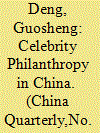

|
|
|
|
|
| Summary/Abstract |
This article provides the first comprehensive analysis of the development of, and public responses to, celebrity-fronted philanthropy in the People's Republic of China. It explores the extent and nature of celebrity philanthropy with reference to a sample of mainland Chinese celebrities in entertainment and sports. It then draws on interviews conducted with employees of large charities to examine the kinds of links that are being forged between China's not-for-profit sector and commercial organizations managing the work of celebrities. Finally, it analyses the responses to a national survey on celebrity and philanthropy. We conclude that the relationship between China's government, not-for-profit and celebrity sectors is becoming more professionalized and organized. This development reveals how the roles and capacities of government are being reconfigured and expanded, even as it also enhances the scope for action and the influence of new social actors and organizations to address government-led national development issues.
|
|
|
|
|
|
|
|
|
|
|
|
|
|
|
|
| 4 |
ID:
171348


|
|
|
|
|
| Summary/Abstract |
What, if anything, is problematic about the involvement of celebrities in democratic politics? While a number of theorists have criticized celebrity involvement in politics, none so far have examined this issue using the tools of social epistemology, the study of the effects of social interactions, practices, and institutions on knowledge and belief acquisition. We will draw on these resources to investigate the issue of celebrity involvement in politics, specifically as this involvement relates to democratic theory and its implications for democratic practice. We will argue that an important and underexplored form of power, which we will call epistemic power, can explain one important way in which celebrity involvement in politics is problematic. This is because unchecked uses and unwarranted allocations of epistemic power, which celebrities tend to enjoy, threaten the legitimacy of existing democracies and raise important questions regarding core commitments of deliberative, epistemic, and plebiscitary models of democratic theory. We will finish by suggesting directions that democratic theorists could pursue when attempting to address some of these problems.
|
|
|
|
|
|
|
|
|
|
|
|
|
|
|
|
| 5 |
ID:
192187
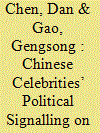

|
|
|
|
|
| Summary/Abstract |
In China, celebrities can dominate public discourse and shape popular culture, but they are under the state's close gaze. Recent studies have revealed how the state disciplines and co-opts celebrities to promote patriotism, foster traditional values and spread political propaganda. However, how do celebrities adapt to the changing political environment? Focusing on political signalling on the social media platform Sina Weibo, we analyse a novel dataset and find that the vast majority of top celebrities repost from official accounts of government agencies and state media outlets, though there are variations. Younger celebrities with more followers tend to repost from official accounts more often. Celebrities from Taiwan tend to repost less than those from the mainland and Hong Kong, despite being subject to the same rules. However, the frequent political signalling by the most influential celebrities among younger generations suggests that the state has co-opted celebrity influence on social media to broadly promote its political objectives.
|
|
|
|
|
|
|
|
|
|
|
|
|
|
|
|
| 6 |
ID:
171351
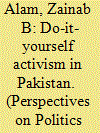

|
|
|
|
|
| Summary/Abstract |
In July 2016, Pakistani social media celebrity Qandeel Baloch was asphyxiated by her brother and gained posthumous celebrity in the West where her death was sensationally categorized as an honor-killing. Yet Qandeel was a celebrity in her own right among South Asians long before her death. Through skillful use of social media, she created new forms of public space and used them to challenge dominant social norms and political practices. I examine Qandeel’s “do-it-yourself activism”—her innovative use of the digital public sphere to position herself as a worthy representative of Pakistani nationality; to critique long-established norms governing gender, class, and sexuality; and to expand the boundaries of national belonging in Pakistan to include culturally rebellious women of limited economic means. By examining Qandeel’s audacious means of standing for Pakistan, her deployment of marriage proposals as a mode of subversive political activism within the political party, Pakistan Tehreek-e-Insaf (Pakistan Movement for Justice, PTI), and her use of visual culture (“selfies”) to challenge the moral authority of a powerful Islamic cleric, I theorize a form of political activism grounded in women’s agency that deploys celebrity to illuminate and politicize injustices.
|
|
|
|
|
|
|
|
|
|
|
|
|
|
|
|
| 7 |
ID:
180347
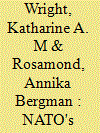

|
|
|
|
|
| Summary/Abstract |
Angelina Jolie's high-profile visit to NATO in 2018 signals a move to brand the alliance's strategic narrative within the language of celebrity through engagement with popular culture. The partnership represents a significant change in the alliance's approach to global security. It also builds on a shift in NATO's self-narrative through the advocacy of gender justice related to the Women, Peace and Security (WPS) agenda. Rather than fading into the background, NATO appears to be pursuing the limelight for the purpose of ‘awareness raising’ as a tool to implement the WPS agenda. Drawing upon feminist scholarship on the WPS agenda, NATO, and research on celebrity humanitarianism and politics, we provide a critical study of this change in NATO's strategic narrative, through the analysis of visual and textual material related to Jolie's visit to NATO. Our focus is on the significance of this partnership and its contribution to legitimising the alliance's self-defined ‘military leadership’ in the area of conflict-related sexual violence. While Jolie's visit to NATO opened the alliance to public scrutiny it also symbolised a form of militarism, surrounded by orchestrated visual representations. As such, it only marginally disrupted the militarist logic present in NATO's wider WPS engagement.
|
|
|
|
|
|
|
|
|
|
|
|
|
|
|
|
| 8 |
ID:
106073
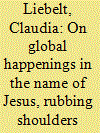

|
|
|
| 9 |
ID:
169453


|
|
|
|
|
| Summary/Abstract |
After Tony Blair resigned as the United Kingdom’s prime minister in June 2007, he was appointed as the official envoy of the Quartet on the Middle East. His appointment was marred with controversy not the least with regard to his suitability for the role and his performance as peace envoy, with many observers questioning his ethical credentials. The EU along with the US, Russia and the UN make up the Quartet and funded Blair’s office until 2012. With the US and the EU as the key regional players in this conflict, Blair became an embodiment of these players in this specific role. This article employs critical discourse analysis to nuance whether Tony Blair’s role as Middle East envoy, and as an embodiment of the EU, was indeed a legitimate one in terms of achieving at least some of its stated aims, particularly those pertaining to the Palestinians who live under Israel’s colonization. It does so by engaging with the work of John Street and more broadly the literature on celebrity politicians and by counterbalancing this conceptual framework with a critical reflection on Blair’s time as Middle East envoy.
|
|
|
|
|
|
|
|
|
|
|
|
|
|
|
|
| 10 |
ID:
128464
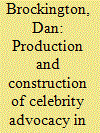

|
|
|
|
|
| Publication |
2014.
|
| Summary/Abstract |
There has been a proliferation of celebrity within development publicity, media events and representations, which has received little attention from development scholars. This paper charts the rise of celebrity within development, drawing from over 120 interviews conducted with development, media and celebrity professionals. I examine how the presence of celebrity within development is mediated and the political economy of the celebrity-charity-corporate complex which results. I use these findings to interrogate recent writings on the work of celebrity advocacy in development and demonstrate that understanding the production and construction of celebrity development interventions helps substantially in understanding their effects.
|
|
|
|
|
|
|
|
|
|
|
|
|
|
|
|
| 11 |
ID:
174506
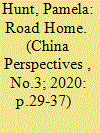

|
|
|
|
|
| Summary/Abstract |
Han Han has attracted a significant amount of popular and scholarly attention since he rose to fame in 1999. While the majority of commentators have concentrated on his ambiguous position as rebel-meets-entrepreneur, this article considers the way in which masculinity is performed and constructed in the Han Han phenomenon. It discusses Han Han’s commercial appearances before turning to his debut film The Continent (2014). The article points to the recurring figure of the adventurous mobile man, demonstrating that this celebration of masculinity on the move is the result of global cultural influences, local traditions of manhood, and new market forces. Founded as it is on a conservative understanding of gender and mobility, Han Han’s performance and construction of masculinity cuts into his reputation as a “deviant genius,” demonstrating further ways in which his cultural rebellion is limited. In particular, this article highlights the ways in which his masculinity is constructed at the expense of women and non-hegemonic men.
|
|
|
|
|
|
|
|
|
|
|
|
|
|
|
|
| 12 |
ID:
159203
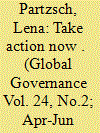

|
|
|
|
|
| Summary/Abstract |
Celebrities are able to mobilize a wide range of people on a global scale. In his Oscar acceptance speech, Leonardo DiCaprio urged his international audience to work collectively to combat climate change. Another example of celebrity activism is Daryl Hannah's support for biofuels and the campaign against the Keystone XL pipeline. In this article, I analyze the legitimacy of such celebrity power in international relations along three criteria (political impact, broad participation, and control and accountability). I argue that, as long as celebrities' claims are vague and do not go further than UN consensus, celebrity power can be considered legitimate through the political impact. In addition, DiCaprio and Hannah contribute civil society perspectives to the international agenda while, however, not necessarily voicing the most marginalized positions. Finally, by urging governments to comply to international agreements, as DiCaprio does, he holds governments accountable on behalf of the public. However, both DiCaprio and Hannah claim to speak on behalf of affected people who cannot hold the celebrities themselves accountable for their political action. This lack of control is problematic if celebrities convey more radical positions that are not generally endorsed by the international community, as Hannah does when protesting against Keystone XL and promoting biofuels.
|
|
|
|
|
|
|
|
|
|
|
|
|
|
|
|
| 13 |
ID:
164420
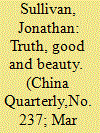

|
|
|
|
|
| Summary/Abstract |
A visit to a Chinese city of any size – looking up at downtown billboards, riding public transport, shopping at a mall – is to be in the presence of a Chinese celebrity endorsing a product, lifestyle or other symbols of “the good life.” Celebrity in China is big business, feeding off and nourishing the advertising-led business model that underpins the commercialized media system and internet. It is also a powerful instrument in the party-state's discursive and symbolic repertoire, used to promote regime goals and solidify new governmentalities through signalling accepted modes of behaviour for mass emulation. The multi-dimensional celebrity persona, and the public interest it stimulates in off-stage lives, requires an academic focus on the workings of celebrity separate to the products that celebrities create in their professional roles. The potential to connect with large numbers of ordinary people, and the emergence of an informal celebrity-making scene in cyberspace symptomatic of changing attitudes towards fame among Chinese people, marks the special status of celebrity within China's constrained socio-political ecology. The motivation for this article is to further scholarly understanding of how celebrity operates in China and to bring this expression of popular culture into the broader conversation about contemporary Chinese politics and society.
|
|
|
|
|
|
|
|
|
|
|
|
|
|
|
|
| 14 |
ID:
144277


|
|
|
|
|
| Summary/Abstract |
The aim of this paper is to bring into conversation two apparently disparate debates in the fields of politics and International Relations. The first is a debate over celebrity humanitarianism that is divided between optimistic scholars, who see in it an enhancement of democracy, and pessimistic scholars, who link it to capitalist imperialism or a throwback to older colonial tropes. The second is a debate over a (new) American empire which has prompted scholars in IR to redress IR’s historic ‘elision’ of empire and to offer new network theories of empire. The paper argues that these two debates each address the shortcomings in the other and offers speculation on what celebrity humanitarianism might have to do with empire by bridging the connections between structuralist political theories of empire and the cultural accounts offered by postcolonial theory.
|
|
|
|
|
|
|
|
|
|
|
|
|
|
|
|
|
|
|
|
|